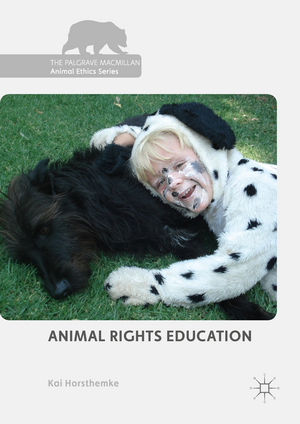Animal Rights Education: The Palgrave Macmillan Animal Ethics Series
Autor Kai Horsthemkeen Limba Engleză Hardback – 15 oct 2018
| Toate formatele și edițiile | Preț | Express |
|---|---|---|
| Paperback (1) | 528.80 lei 43-57 zile | |
| Springer International Publishing – 25 ian 2019 | 528.80 lei 43-57 zile | |
| Hardback (1) | 703.52 lei 43-57 zile | |
| Springer International Publishing – 15 oct 2018 | 703.52 lei 43-57 zile |
Din seria The Palgrave Macmillan Animal Ethics Series
- 18%
 Preț: 786.52 lei
Preț: 786.52 lei - 8%
 Preț: 588.34 lei
Preț: 588.34 lei - 8%
 Preț: 538.07 lei
Preț: 538.07 lei - 20%
 Preț: 814.16 lei
Preț: 814.16 lei - 20%
 Preț: 691.10 lei
Preț: 691.10 lei - 17%
 Preț: 524.04 lei
Preț: 524.04 lei -
 Preț: 224.33 lei
Preț: 224.33 lei - 18%
 Preț: 1238.56 lei
Preț: 1238.56 lei - 18%
 Preț: 894.46 lei
Preț: 894.46 lei - 15%
 Preț: 648.24 lei
Preț: 648.24 lei -
 Preț: 384.86 lei
Preț: 384.86 lei - 15%
 Preț: 590.49 lei
Preț: 590.49 lei -
 Preț: 390.63 lei
Preț: 390.63 lei -
 Preț: 482.17 lei
Preț: 482.17 lei -
 Preț: 384.86 lei
Preț: 384.86 lei -
 Preț: 485.24 lei
Preț: 485.24 lei - 18%
 Preț: 883.75 lei
Preț: 883.75 lei - 18%
 Preț: 727.97 lei
Preț: 727.97 lei -
 Preț: 383.93 lei
Preț: 383.93 lei -
 Preț: 380.45 lei
Preț: 380.45 lei - 18%
 Preț: 737.12 lei
Preț: 737.12 lei - 15%
 Preț: 644.18 lei
Preț: 644.18 lei - 15%
 Preț: 698.15 lei
Preț: 698.15 lei -
 Preț: 385.84 lei
Preț: 385.84 lei - 18%
 Preț: 1111.53 lei
Preț: 1111.53 lei -
 Preț: 380.25 lei
Preț: 380.25 lei - 18%
 Preț: 780.82 lei
Preț: 780.82 lei - 15%
 Preț: 700.94 lei
Preț: 700.94 lei - 15%
 Preț: 639.73 lei
Preț: 639.73 lei -
 Preț: 414.21 lei
Preț: 414.21 lei - 18%
 Preț: 787.47 lei
Preț: 787.47 lei - 18%
 Preț: 723.24 lei
Preț: 723.24 lei -
 Preț: 379.68 lei
Preț: 379.68 lei -
 Preț: 383.93 lei
Preț: 383.93 lei -
 Preț: 383.12 lei
Preț: 383.12 lei
Preț: 703.52 lei
Preț vechi: 827.67 lei
-15% Nou
Puncte Express: 1055
Preț estimativ în valută:
134.66€ • 146.32$ • 113.19£
134.66€ • 146.32$ • 113.19£
Carte tipărită la comandă
Livrare economică 21 aprilie-05 mai
Preluare comenzi: 021 569.72.76
Specificații
ISBN-13: 9783319985923
ISBN-10: 3319985922
Pagini: 280
Ilustrații: XX, 358 p. 1 illus.
Dimensiuni: 148 x 210 x 22 mm
Greutate: 0.6 kg
Ediția:1st ed. 2018
Editura: Springer International Publishing
Colecția Palgrave Macmillan
Seria The Palgrave Macmillan Animal Ethics Series
Locul publicării:Cham, Switzerland
ISBN-10: 3319985922
Pagini: 280
Ilustrații: XX, 358 p. 1 illus.
Dimensiuni: 148 x 210 x 22 mm
Greutate: 0.6 kg
Ediția:1st ed. 2018
Editura: Springer International Publishing
Colecția Palgrave Macmillan
Seria The Palgrave Macmillan Animal Ethics Series
Locul publicării:Cham, Switzerland
Cuprins
Part I: Animals and morality.- Chapter 1. The minds and interests of animals.- Chapter 2. Moral anthropocentrism, non-paradigmatic cases, and speciesism.- Chapter 3. Non-anthropocentric views, animals as moral subjects, and equality.- Part II: Animals and education.- Chapter 4. Moral education and animals.- Chapter 5. Environmental education and education for sustainability, biophilia and ecophilia.- Chapter 6. Humane education and theriophilia.- Chapter 7. Philosophical posthumanism, critical pedagogy and ecopedagogy.- Chapter 8. Critical animal studies and animal standpoint theory.- Chapter 9. Vegan education.- Part III: Animal rights and education.- Chapter 10. The place of rights in morality, and animal rights education.- Chapter 11. Loose ends and remaining problems.- Chapter 12. Change, emancipation, and some practical suggestions for animal rights education.
Recenzii
“This book is useful for educators, researchers, and students of animal rights philosophy. The author evaluates the arguments for animals' moral status from philosophers such as Peter Singer, Tom Regan, and Gary Francione. The animal rights field is burgeoning and not without controversy. This book provides thorough analysis and insight into animal rights and how they can be implemented in education.” (Sarah Allison, Doody's Book Reviews, February, 2019)
Notă biografică
Kai Horsthemke is an Associate Professor and teaches Philosophy of Education at KU Eichstätt-Ingolstadt, Germany. He is also a Visiting Professor at the Wits School of Education, University of the Witwatersrand, South Africa, and Fellow of the Oxford Centre for Animal Ethics, UK. His research interests include African philosophy and indigenous knowledge systems.
Caracteristici
Explores how the ethical treatment and status of other-than-human animals influence pedagogy, teaching, and learning Examines key trends in animal rights education Discusses animal minds and interests, and how animals have been accommodated in moral theory Investigates whether anti-racist and anti-sexist education logically entail anti-speciesist education Proposes animal rights education as a viable and sound alternative that can potentially facilitate lasting change
